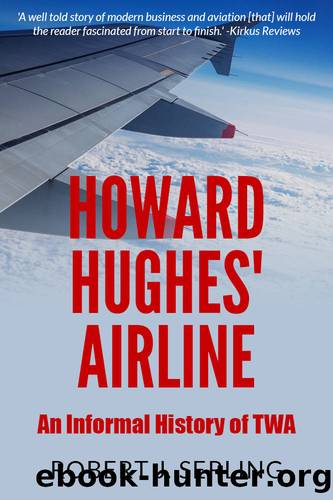Howard Hughes' Airline: An Informal History of TWA by Robert J Serling

Author:Robert J Serling [Serling, Robert J]
Language: eng
Format: epub
Publisher: Endeavour Media
Published: 2017-01-02T21:00:00+00:00
11
Pythias Finds His Damon
Two significant events preceded the selection of TWAâs new president. Both involved Juan Trippeâs Chosen Instrument concept. Three times the wily president of Pan American had been defeated on this issue, twice in Congress and once before the Civil Aeronautics Board, but Trippeâs major strength was persistency. If a front door was locked he went around to the back.
Early in 1947, Trippe got Sen. Owen Brewster of Maine to introduce another Chosen Instrument bill, one which had Trippeâs fingerprints all over it. This was not surprising. In Washington, Brewster was known as âthe senator from Pan Am,â and Howard Hughes himself contemptuously referred to him as âTrippeâs mouthpiece.â Both Hughes and Noah Dietrich were furious at this latest version of the Chosen Instrument, which they regarded, with considerable justification, as one aimed not only at creating a single international U.S. flag carrier but as a means of destroying TWA.
The legislation once again strove to actualize the concept of one U.S. international airline theoretically owned by a number of carriers but operated by Pan Am. It added a provision, however, that set a retroactive âdeadlineâ for cutting off ownership of international assets â October 1945. It was no wonder Hughes interpreted this as a knife held at TWAâs throat; TWA had started its overseas operations after that date, so that while it would be able to hold stock in a flag carrier, it would not be compensated for its international route investments. What infuriated Hughes even more was the fact that Trippe already had made overtures for either a TWA-Pan Am merger, or the sale of TWAâs international routes to Pan Am.
Shortly after Brewster introduced the bill, Hughes was summoned to Washington to testify in closed session before the Senate War Investigating Committee, of which the Maine senator was a member. The committee was probing wartime contracts, and included on the agenda were the $60 million worth of contracts Hughes had been granted for airplanes that had never got past the prototype stage. The prime target was the mammoth flying boat Hercules Hughes had built largely with government funds. Made of plywood, it had acquired the nickname âSpruce Goose,â and Hughes was not only inordinately proud of it but extremely sensitive on the subject of whether it could actually fly.
Before the hearings began, Hughes â apparently seeking to mend some fences (and perhaps on Dietrichâs advice) â agreed to lunch with Brewster. The two men met in Hughesâ suite at the Mayflower Hotel. Ostensibly, they discussed the giant flying boat, but Hughes claimed later that they also discussed two other topics: the Chosen Instrument bill or a possible Pan Am-TWA deal in which Hughesâ airline would sell its international routes to Pan Am. Brewster denied that either subject was raised at the Mayflower meeting, but his denial appears to have been somewhat evasive. The meeting in the suite was not their only contact, for the next day Hughes used his own plane to fly Brewster to an appointment in Columbus and later to Morgantown, West Virginia, and back.
Download
This site does not store any files on its server. We only index and link to content provided by other sites. Please contact the content providers to delete copyright contents if any and email us, we'll remove relevant links or contents immediately.
| Airport | Commercial |
| Helicopters | History |
| Pictorial | Piloting & Flight Instruction |
| Repair & Maintenance |
Small Unmanned Fixed-wing Aircraft Design by Andrew J. Keane Andras Sobester James P. Scanlan & András Sóbester & James P. Scanlan(32789)
Navigation and Map Reading by K Andrew(5150)
Endurance: Shackleton's Incredible Voyage by Alfred Lansing(4769)
And the Band Played On by Randy Shilts(2197)
The Box by Marc Levinson(1989)
Top 10 Prague (EYEWITNESS TOP 10 TRAVEL GUIDES) by DK(1985)
Wild Ride by Adam Lashinsky(1972)
The Race for Hitler's X-Planes: Britain's 1945 Mission to Capture Secret Luftwaffe Technology by John Christopher(1862)
The One Percenter Encyclopedia by Bill Hayes(1825)
Trans-Siberian Railway by Lonely Planet(1752)
Girls Auto Clinic Glove Box Guide by Patrice Banks(1724)
Bligh by Rob Mundle(1689)
Looking for a Ship by John McPhee(1674)
Good with Words by Patrick Barry(1655)
Batavia's Graveyard by Mike Dash(1650)
TWA 800 by Jack Cashill(1649)
Fighting Hitler's Jets: The Extraordinary Story of the American Airmen Who Beat the Luftwaffe and Defeated Nazi Germany by Robert F. Dorr(1622)
Troubleshooting and Repair of Diesel Engines by Paul Dempsey(1595)
Ticket to Ride by Tom Chesshyre(1586)
